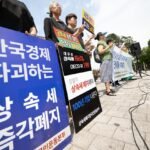
The South Korean stock market logged its biggest daily loss of more than 5% in eight months on Monday, joining its Asian peers bruised by stock panic selling on growing economic concerns fanned by greater US tariff shockwaves.
The country’s main benchmark Kospi index closed down 5.6% at 2,328.2 on Monday, and the secondary Kosdaq lost 5.3% to end at 651.30.
The Kospi’s loss marked its biggest daily fall since Aug. 5, 2024, when it tumbled 10.6%.
Foreign investors rushed to sell off stocks worth 2.09 trillion won in net value on the Kospi market, marking their heaviest selloff this year. Retail and institutional investors net purchased 1.67 trillion won and 253.1 billion won, respectively.
Kospi heavyweights Samsung Electronics Co. and SK Hynix Inc. sank 5.2% and 9.6%, respectively, largely driving the Kospi’s overall downfall. Other large-cap stocks such as LG Energy Solution Ltd. and Hyundai Motor Co. also suffered heavy losses.
Immediately after the stock market opened on Monday, a sidecar trading halt took effect on the Kospi 200 Futures index for five minutes, the first sidecar since last August.
A sidecar is activated to prevent panic selling when the Kospi 200 Futures index rises or falls more than 5% and maintains that gain or loss for at least one minute.
The Korean currency also weakened sharply against the greenback on Monday.
The won closed the day trading at 1,467.8 against the US dollar, recording its biggest daily loss of 33.7 since March 19, 2020 in the wake of the COVID-19 outbreaks.
GLOBAL TRADE WAR CONCERN TRIGGERS PANIC SELLING
Foreign investors dumped shares across Asia on growing concerns that US tariffs could lead the global economy to enter stagflation, an economic condition marred by slow growth, high unemployment and inflation.
Over the weekend, US President Donald Trump reaffirmed his hardline stance on tariffs, saying that the US government has no plan to ease its higher-than-expected reciprocal tariffs on other countries “unless they pay us a lot of money.”

The US slapped South Korea with a reciprocal tariff of 25%, which will take effect as of April 9.
Against the US tariffs, China struck back on Friday with a 34% tariff on US imports, fanning fears that the world would be embroiled in one of the worst trade wars in history.
Citing the latest US tariff policy, Goldman Sachs has raised the odds of a U.S. recession to 45% in the next 12 months from its previous 35% forecast.
Meanwhile, the US Federal Reserve has limited options, primarily keeping a wait-and-see approach for the time being, as it requires time to assess the effects of US tariffs on inflation in the world’s leading economy.
“Considering that Korea exports a significant amount of intermediate goods, Korea is one of the markets foreigners tend to avoid first,” said Chung Yong-taek, a senior analyst at IBK Securities Co.
Korea’s mainstay export items are semiconductors, auto parts, petrochemical and steel products.
“Everything from each country’s final tariff to their impact on the global economy remains uncertain, triggering risk aversion,” said Chung. “It is hard to project where the bottom of the market is or how long uncertainty would persist.”
TIME TO BUY FOR THE LONG TERM?
But some market analysts suggest investors buy the dip amid tariff selloffs for long-term investment.
On Monday, Korea’s main Kospi index traded at 0.83 times the 12-month trailing price-to-book (PBR) ratio, the historic low of its kind.
The KOSPI 200 Volatility Index, or the V-KOSPI, climbed to 44.23, up 65% from the previous session. When the V-KOSPI crosses 40, it suggests the stock market is in the panic selling stage.
According to Eugene Investment & Securities Co., the odds of a rebound in the Kospi index were 87% about three months after the V-KOSPI topped 40 and 100% about six months later.
“The market has always regained the ground after a period of severe undervaluation,” said Kim Hak-kyun Kim, head of research at Shinyoung Securities Co.
But for the stock market to rebound, the U.S. must ease blanket tariffs first, said analysts.
By Sung-Mi Shim, Han-Gyeol Seon and See-Eun Lee
smshim@hankyung.com
Sookyung Seo edited this article.















